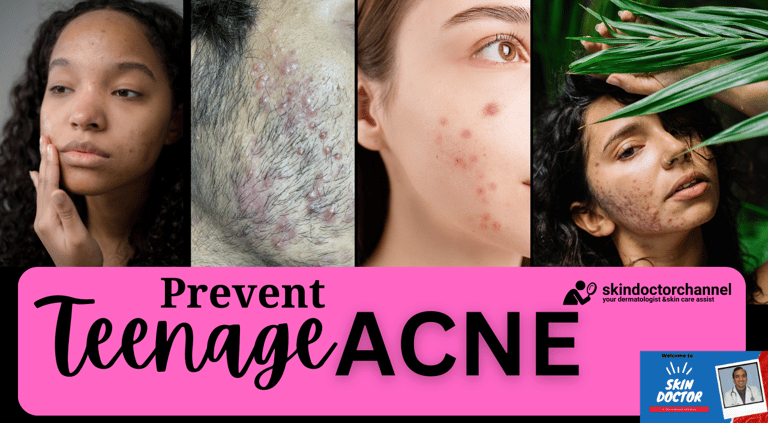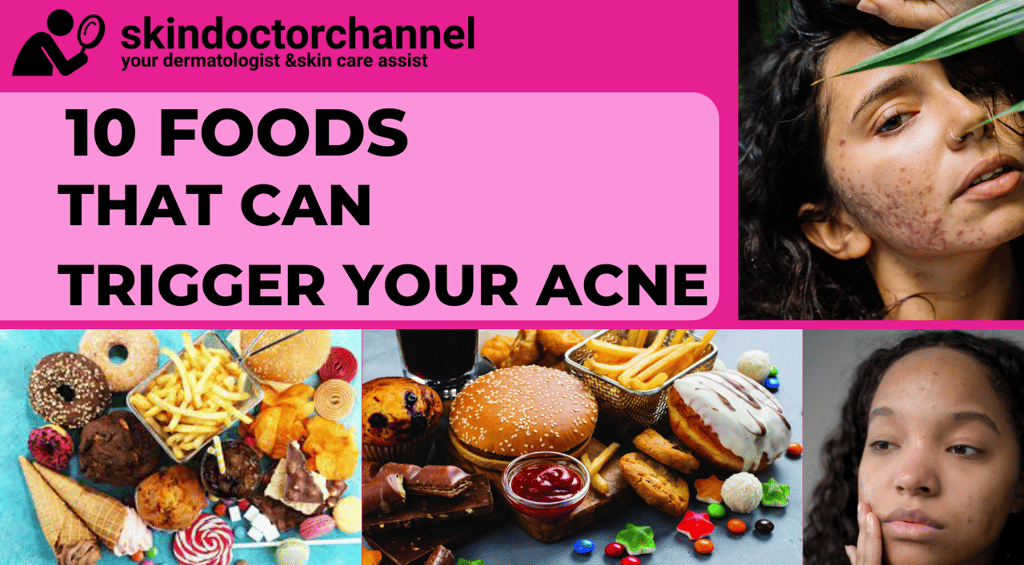10 Foods that can Trigger your Acne
Certain foods can exacerbate skin issues, and being aware of them is the first step toward clearer skin; what you eat can impact your skin's appearance, and certain foods are known to trigger or exacerbate acne breakouts. In this article, we'll explore 10 foods that can potentially trigger your acne and provide insights into making healthier dietary choices for clearer skin.
Dr.Sujith Karimbil
8/28/20233 min read
skindoctor
Dont miss
Watch video on teenage acne causes ; https://www.youtube.com/watch?v=Lkkd5SW1yTY




10 Foods That Can Trigger Your Acne
Acne is a common skin condition that can affect people of all ages, and can significantly impact self-esteem and overall well-being. While genetics,hormones, and skincare routines play a significant role in the development of acne, diet also plays a crucial role in influencing skin health
The old adage "You are what you eat" certainly holds true in the case of acne. Certain foods can exacerbate skin issues, and being aware of them is the first step toward clearer skin; what you eat can impact your skin's appearance, and certain foods are known to trigger or exacerbate acne breakouts. In this article, we'll explore 10 foods that can potentially trigger your acne and provide insights into making healthier dietary choices for clearer skin.
1. Dairy Products:
Dairy products like milk, cheese, and Mayonnaise can contain hormones that may promote excess oil production and inflammation in the skin, Dairy products, particularly cow's milk, naturally contain trace hormones such as estrogen, progesterone, and androgens, which can potentially disrupt the delicate hormonal balance within the body. These hormones have been shown to stimulate the production of sebum, an oily substance that plays a central role in acne development Opt for non-dairy alternatives such as almond milk or coconut yogurt if you suspect dairy might be affecting your skin.
2. Sugary Treats:
Highly processed sugary foods like candy, milk chocolates, pastries, and sugary beverages can lead to elevated insulin levels, potentially promoting inflammation and acne. Try to limit your consumption of these foods and opt for natural sweeteners like honey or fruits instead While the link between chocolate and acne isn't completely clear, some studies suggest that high levels of sugar and dairy in chocolate could be potential triggers for acne in certain individuals.3. High-Glycemic Foods:
3. Foods with a high glycemic index, such as white bread, white rice, and sugary cereals, can cause rapid spikes in blood sugar levels. These spikes may lead to increased oil production and inflammation, which are factors that contribute to acne flare-ups. Choose whole grains and complex carbohydrates for stable blood sugar levels.
4. Greasy and Fried Foods:
Fried foods and those high in unhealthy fats can contribute to clogged pores and worsen acne. Replace deep-fried items with foods cooked using healthier methods like grilling, or steaming.
5. Processed Meats:
Processed meats like sausages, bacon, and hot dogs often contain additives and preservatives that could potentially trigger inflammation in the body, leading to acne breakouts. Opt for Plant-based protein sources
6. High-Iodine Foods:
Certain foods, particularly those rich in iodine like seaweed, shellfish, and iodized salt, can exacerbate acne in individuals who are sensitive to iodine. If you notice a correlation between these foods and your breakouts, consider moderating your intake.
7. Spicy Foods:
Spicy foods may dilate blood vessels and increase blood flow to the skin, potentially triggering inflammation and acne in some individuals. While not everyone is affected, if you suspect spices are contributing to your breakouts, try reducing your intake.
8. Nuts and Nut Butters:
Nuts, especially those high in omega-6 fatty acids, might promote inflammation when consumed in excess. Opt for nuts rich in omega-3 fatty acids like walnuts and almonds, and moderate your intake of nut butters.
9. Excessive Caffeine:
While moderate caffeine consumption is generally safe, excessive intake from sources like energy drinks or high-caffeine beverages might contribute to stress and hormonal imbalances, potentially worsening acne symptoms.
10. Artificial Additives:
Artificial additives, such as artificial colors and flavors, found in many processed foods, may contribute to skin irritation and inflammation in some individuals. Opt for whole, minimally processed foods to reduce your exposure to these additives.
While there's no one-size-fits-all approach to managing acne through diet, paying attention to what you eat can certainly make a difference. If you suspect certain foods are contributing to your acne breakouts, consider keeping a food diary to track your skin's responses. It's important to remember that individual responses to foods can vary, so consulting with a dermatologist or healthcare professional can help you make more informed dietary choices for healthier, clearer skin. Maintaining a balanced diet rich in whole foods, fruits, vegetables, plant-based proteins, and healthy fats is generally beneficial for your skin's health. Drinking plenty of water, practising good hygiene, are also crucial steps in managing and preventing acne.
